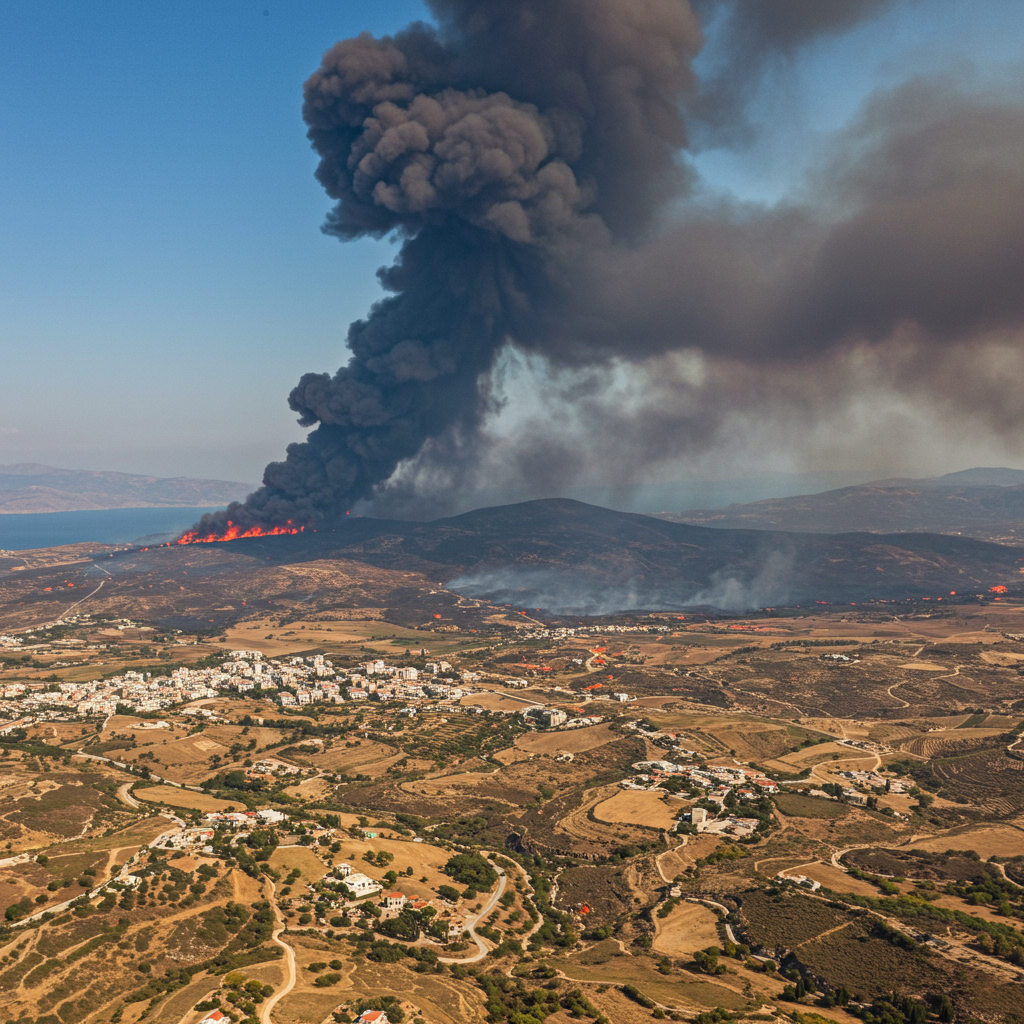The summer of 2024 has unleashed an unprecedented wildfire crisis across Southern Europe. A relentless heatwave, combined with scorching winds, is fueling destructive blazes from Portugal to the Balkans. These infernos threaten major cities and force mass evacuations. At the epicenter of this unfolding emergency, Greece faces a particularly dire situation. It battles numerous blazes, desperately seeking international aid. This escalating crisis underscores the growing impact of climate change on our world.
Greece’s Dire Wildfire Battle: Patras Under Siege
Patras, Greece’s third-largest city, with a population of approximately 200,000, finds itself directly in the path of fast-moving wildfires. Extreme temperatures, hitting 38C, and powerful winds drive the flames. These factors pushed the inferno into the city’s outskirts. Urgent evacuations became necessary. A children’s hospital was among the facilities cleared. Thick plumes of smoke blanketed the skyline, causing breathing difficulties for many residents.
The scale of devastation in the surrounding Achaia region is staggering. Nearly 10,000 hectares of land have been consumed by fire in just two days. Entire villages were emptied. Homes and businesses lay destroyed. Hundreds of vehicles, including over 500 cars at a Patras customs yard, were incinerated. Patras’ streets lay deserted as some residents watched in silence. The fires descended ominously from surrounding mountains.
Beyond Patras, the threat extends to Greece’s popular islands. Coastguards evacuated dozens of people as fires inched dangerously close to beaches on Zante and Chios. Greek authorities are currently battling over 20 wildfires nationwide. More than 4,800 firefighters are on the ground. In response to the overwhelming scale, Greece has urgently requested additional water bombers from other European Union countries. The grim statistics highlight the severity: 199 wildfires have already consumed nearly 99,000 hectares across Greece this year. This total effectively doubled last year’s figure by mid-August. Investigations into several outbreaks strongly suggest arson as a potential cause.
Europe Engulfed: A Continent-Wide Emergency
The wildfire emergency is not confined to Greece. A searing heatwave has blanketed much of Southern Europe. It sparks blazes and triggers severe warnings across the continent. This is truly a pan-European challenge, demanding collective resilience and response.
Spain has endured its tenth consecutive day of extreme heat. Temperatures peaked at an astonishing 45C. The human toll is tragic: a civilian and a volunteer firefighter died. Almost all of Spain remains under an extreme or very high fire risk. Meteorologists predict this will be one of the country’s longest heatwaves on record. More than 4,000 people were evacuated overnight in León. Near Madrid, an equestrian center employee died after severe burns. This crisis has even ignited a political controversy, as the Transport Minister criticized a regional leader for vacationing amidst the emergency. Flames threatened a world heritage Roman site and forced over 6,000 evacuations during this period.
Portugal is also battling significant wildfires, deploying 1,800 firefighters against five major blazes. One particularly challenging inferno in the eastern town of Trancoso reignited after being struck by lightning. This demonstrates the volatile nature of these events.
In Albania, the defense minister described the situation as a “critical week.” Twenty-four wildfires have forced residents to abandon central villages. This highlights the direct threat to communities.
Italy managed to bring a five-day blaze on Mount Vesuvius under control. However, 16 cities remain under extreme heat warnings, with Florence reaching 39C. The heat was so intense that Pope Leo moved his weekly audience from St. Peter’s Square to an indoor venue at the Vatican.
Even the United Kingdom is not immune. Parts of Britain entered their fourth heatwave of the summer. Temperatures are forecast to reach 34C. Health officials warn of potential strain on care services. Recent incidents include significant grassfires in London. Two separate blazes burned over 17 acres. Further north, the North Yorkshire Fire & Rescue Service (NYFRS) declared a major incident for a significant moorland blaze on Langdale Moor, spanning roughly 5 square kilometers. This fire notably “jumped” a fire break. Difficult-to-extinguish peat soil is burning deep underground.
Scotland issued a “very high” wildfire risk warning, its tenth this year. Human activity causes the vast majority of these incidents. A gorse blaze on Arthur’s Seat in Edinburgh serves as a direct example. In Montenegro, a soldier died when his water tanker overturned while battling flames. Turkey also saw major fires, including those in Canakkale and Izmir, prompting evacuations and transport closures.
The Accelerating Impact of Climate Change and Human Factors
Scientists and meteorologists are unanimous: such extreme weather events are becoming more frequent and severe. Prolonged heatwaves and increasingly intense wildfires are directly linked to human-induced climate change. Global warming makes Mediterranean summers hotter and drier. This creates ideal conditions for blazes to ignite and spread with unprecedented speed and ferocity. This environmental shift fuels longer and more destructive fire seasons across Europe.
Beyond climate change, human activity plays a crucial role in wildfire ignition. While some fires occur naturally, for example, from lightning strikes, the vast majority result from human behavior. These are often unintentional ignitions. Discarded cigarettes, untended campfires, or portable barbecues are common culprits. Even broken glass, acting as a magnifying lens, can easily ignite dry vegetation. The number of outbreaks suspected to be arson in Greece further underscores the significant human element.
Actionable Steps for Wildfire Prevention
Given that human activity is a leading cause of wildfires, prevention becomes a critical, actionable step for everyone. This applies to local residents and tourists alike. Authorities across Europe are issuing clear guidelines to mitigate risk:
Avoid Naked Flames: Never use portable barbecues or light campfires in or near areas with dry vegetation. This includes woodlands, grasslands, moorlands, and even residential gardens in high-risk areas.
Dispose of Waste Responsibly: Take all rubbish home, especially glass. Broken glass can concentrate sunlight and easily ignite dry grass or leaves.
Cigarette Safety: Never discard cigarettes on the ground. Ensure they are fully extinguished and placed in a non-combustible bin.
Be Vigilant: Report any signs of smoke or fire immediately to emergency services. Early detection can prevent small blazes from escalating into major infernos.
- Follow Local Alerts: Adhere to all local warnings and evacuation orders issued by authorities during periods of high fire risk.
- www.bbc.com
- www.bbc.com
- www.bbc.com
- www.bbc.com
- www.bbc.com
Frequently Asked Questions
What is fueling the current European wildfires?
The current surge in European wildfires is primarily fueled by a severe and prolonged heatwave across Southern Europe. This leads to extremely dry conditions and high temperatures, often exceeding 40C. Strong winds further exacerbate the situation, causing fires to spread rapidly. Scientists universally agree that human-induced climate change is making these extreme weather events, including heatwaves and intense wildfires, more frequent and severe. This creates a perfect storm for widespread blazes.
Which regions or cities are most affected by the European wildfire crisis?
The wildfire crisis is widespread across Southern Europe. Greece is particularly hard-hit, with its third-largest city, Patras, facing direct threat. Extensive destruction has occurred in the surrounding Achaia region. Popular islands like Zante and Chios have also seen fires approaching beaches. Other severely impacted countries include Spain, which has experienced record-breaking heat and numerous evacuations. Portugal battles multiple major blazes. Albania has 24 wildfires forcing evacuations. Even Italy and the United Kingdom have faced significant fire risks and incidents due to the heatwave.
What steps can individuals take to prevent wildfires?
Individuals can play a crucial role in wildfire prevention, as most blazes are human-caused. Essential steps include avoiding naked flames outdoors, such as portable barbecues or campfires, especially near dry vegetation. It’s critical to dispose of all waste responsibly, particularly glass, which can act as a magnifying lens. Ensuring cigarettes are fully extinguished and never discarded on the ground is also vital. Always remain vigilant and report any signs of smoke or fire to emergency services immediately. Adhere strictly to all local warnings and evacuation orders.
Conclusion
The wildfire crisis gripping Europe is a stark reminder of the escalating consequences of climate change. It highlights the urgent need for both global and individual action. From the charred landscapes of Greece to the scorching cities of Spain, the impact is profound. It affects lives, livelihoods, and natural habitats. While emergency services battle tirelessly, the collective responsibility to mitigate human-caused ignitions and adapt to an increasingly volatile climate becomes paramount. This isn’t just a regional issue; it’s a global call for vigilance, sustainable practices, and coordinated emergency preparedness to safeguard our communities and environment from future wildfire threats.




